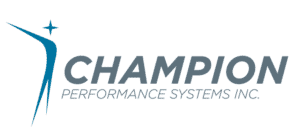In the realm of executive coaching, where guidance, mentorship, and empowerment are paramount, the right questions from an executive coach can be very telling. By asking the right questions, coaches can ensure a productive and positive start to the coaching journey with you.
This blog post aims to shed light on the power of effective questioning in the coaching process and guide you in knowing what to look for in your initial meeting (the good and the bad).
Whether you’re a CEO, a business leader, an executive, or a manager, understanding the dynamics of effective questioning can fuel your search to find the right coaching style for your needs.
Here you’ll learn about various types of questions and the importance of how they are asked.
Moreover, we’ll point out the types of questions that could potentially derail a coaching session and are a good indicator of a relationship that may not give you the return on your investment you’re expecting.
Understanding the Importance of Effective Coaching Questions
Questions are at the heart of coaching. They are the primary tools an executive coach uses to steer conversations and facilitate learning.
The right questions can ignite discovery, inspire curiosity, and lead to insights. This is because asking the right questions can encourage self-reflection, helping individuals to explore their thoughts and feelings, and ultimately guide them towards their own solutions.
The impact of effective questions on the coaching outcome is significant. They foster engagement, deepen understanding, and stimulate creative thinking.
Powerful questions can expose the root cause of challenges, reveal new perspectives, and facilitate transformational learning.
4 Different Types of Coaching Questions to Expect
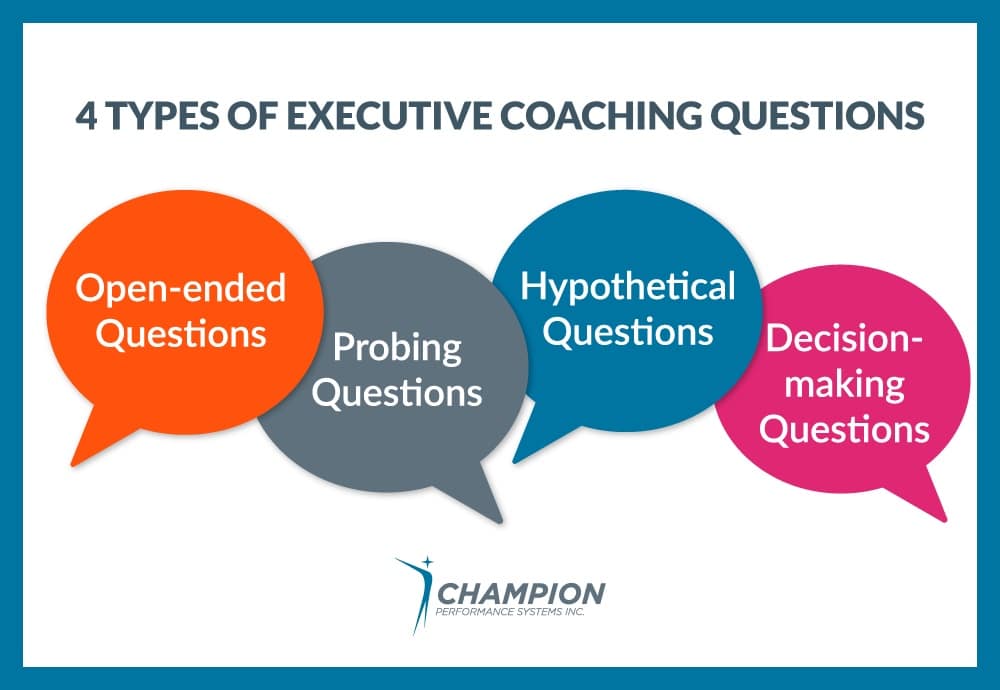
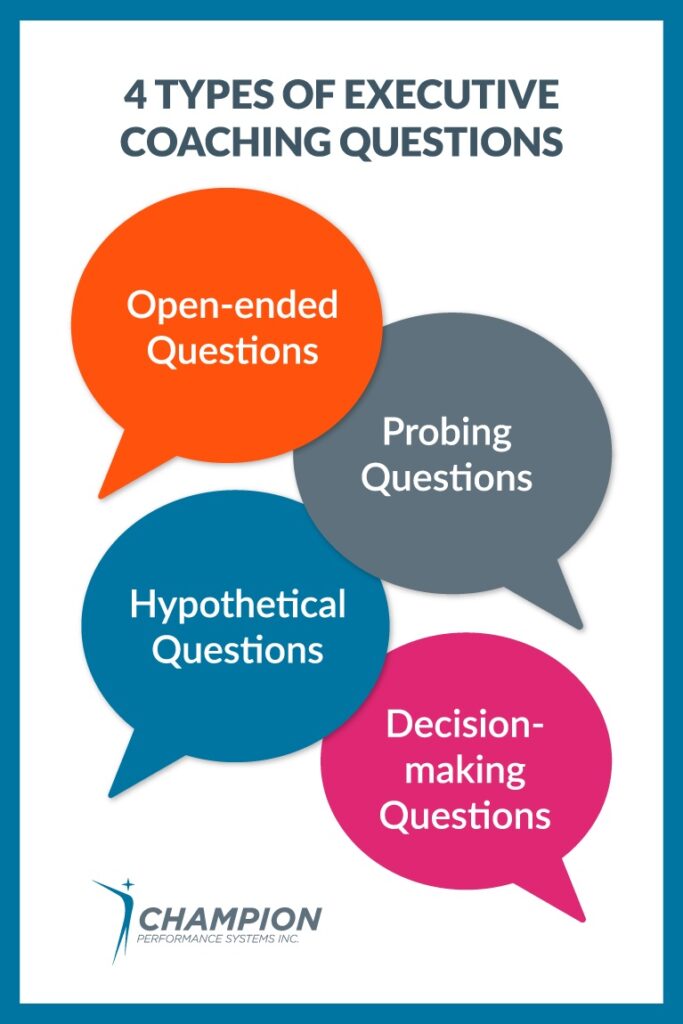
Each type of question in a coaching session has its own motive.
A seasoned executive coach will know how to guide the conversation in a way that helps the coachee come to a resolution, rather than the coach providing solutions. This approach empowers the client to take ownership of their personal and professional development and fosters a culture of continuous learning and self-improvement.
Here are some common question types used in coaching and their respective purposes.
Open-ended questions
Open-ended questions are fundamental tools that can stimulate meaningful dialogue. These questions, which cannot be answered with a simple ‘yes’ or ‘no’, encourage you, the coachee, to delve deeper into your thoughts and feelings, providing a richer understanding of your perspective.
They tend to begin with ‘what’, ‘how’, ‘when’, or ‘who’, and they encourage the exploration of options, ideas, and possibilities.
Effective utilization of open-ended questions can help to establish rapport, build trust, and foster a sense of ownership. When used appropriately, they can lead to profound insights and breakthroughs. For instance, questions such as “What would success look like for you?” or “How would you handle a similar situation in the future?” can guide the coachee towards self-reflection and self-discovery.
Probing Questions
Probing questions are another powerful type in a coach’s toolkit. When used wisely, they can help uncover underlying issues or beliefs that might not be immediately apparent. These questions can challenge the coachee to reflect on their assumptions, potentially leading to breakthroughs in their understanding.
For instance, a probing question such as, “What do you think is the root cause of this issue?” can reveal deeper insights into the matter and uncover underlying beliefs.
Hypothetical Questions
Hypothetical questions allow coachees to explore potential scenarios and their possible consequences.
By imagining different outcomes, they can gain a better understanding of their own preferences and the potential implications of their decisions.
In essence, these types of questions extend the coachee’s thinking beyond the present, facilitating strategic planning and foresight.
For example, a hypothetical question such as, “What would be the best possible outcome of this situation?” can help to explore potential advantages that may otherwise remain hidden. Similarly, “What would happen if you decided to do nothing?” can help to recognize the importance of taking action.
Decision-Making Questions
Decision-making questions help individuals to weigh their options and evaluate the potential consequences of their choices. These questions can be extremely useful in guiding the coachee to make informed decisions and take ownership of their choices.
For instance, a question like, “What factors should you consider before making a decision?” can help to identify the relevant factors and gain choice clarity. Similarly, “What is the cost of inaction?” can help the coachee recognize the importance of taking action, while “What do you need to let go of to make this decision?” can provide insight into potential obstacles that may be hindering the decision-making process.
These are just a few examples of how powerful coaching questions can facilitate strategic thinking and decision-making. When used effectively, these questions can lead to decisive actions and contribute to the overall success of the individual or team being coached.
Executive Coach Selection—The Best and Worst Questions During an Initial Coaching Session
The first meeting with an executive coach can make or break the potential coaching relationship.
These initial questions set the tone and establish trust and rapport between the coach and the client.
Effective questioning will allow the coachee to open up, share their fears, aspirations, and expectations, creating a conducive environment for subsequent sessions.
However, some questions can be less effective or even detrimental, creating a barrier between the coach and the coachee, stunting growth, or leading the conversation astray.
As you vet executive coaches during your initial conversations, pay attention to the types of questions being asked. Knowing what to look for will provide insights into a coach’s style and help you determine if an ongoing relationship would be effective.
The Best Types of Questions Asked in An Initial Coaching Session
A quality coach will strike a balance between being challenging and supportive and always aims to facilitate constructive and insightful dialogue.
When beginning the session, a question the coach might ask is, “What are your expectations from this coaching?” This question allows you, the client, to express your expectations and it helps the coach understand your objectives.
Another question that might be asked is, “What challenges are you currently facing that you hope coaching can help resolve?” This question is meant to encourage you to share your pain points, and provide a clear picture of the issues at hand.
If the coach asks something like, “When do you hope to achieve the goals we have established during this coaching session?” it is because they are trying to gauge your vision of success. Understanding this vision can guide the coach in tailoring the sessions to meet these expectations. Similarly, “What are your long-term goals and how do these coaching sessions fit into that plan?” can provide insight into the broader vision and how coaching plays a role in achieving it.
Remember, these initial questions aim to build a connection, understand your needs, and set a solid foundation for the coaching relationship.
The Worst Types of Questions Asked in An Initial Coaching Session
In the pursuit of effective coaching, it’s also essential to understand the types of questions that may hinder the process rather than enhance it. Look for red flags during your first discussion with a potential coach.
For instance, closed-ended questions that elicit a mere ‘yes’ or ‘no’ response can fail to promote deeper conversation and exploration. While some close-ended questions might be asked during an initial conversation (due to limited time), the amount should be very low compared to the open-ended questions asked.
Similarly, leading questions, where the coach steers the respondent towards a specific answer, can also be counterproductive. They can limit the coachee’s thought process and prevent authentic and insightful responses. For example, if a coach asks a question like, “Don’t you think you should have handled that differently?” this could relay a sense of negative judgment and may restrict the coachee’s openness to explore their actions freely.
Another category to avoid is hypothetical questions that are too far removed from the coachee’s reality. While hypotheticals can be useful for exploring possibilities, questions like “What would you do if you won the lottery?” can be too unrealistic and distract from relevant issues.
Finally, questions that invoke defensiveness or are overly confrontational can also obstruct effective coaching. For instance, “Why did you do that?” can sound accusatory and put the coachee on the defensive, inhibiting open dialogue.
Paying attention to the questions asked in an initial meeting is key to getting an idea of how positive or productive future coaching sessions might be.
21 Quality Coaching Questions to Look for in the First Conversation and Beyond
An executive coach’s job is to unravel the underlying issues, stimulate critical thinking, spark introspection, and drive actionable solutions. The questions they ask are designed to help business leaders and teams to perform better, by encouraging reflection on practices, identifying areas for improvement, and creating a plan for the future.
The right questions, from the first meeting to the last, can be instrumental in unlocking a wealth of insight and facilitating personal or professional growth.
Here are 21 powerful coaching questions that can be asked by a coach across various scenarios—during or after the initial conversation:
- What is the biggest challenge you are facing right now?
- How does this situation make you feel?
- What are your options?
- What are the consequences of not taking action?
- What are the potential benefits of taking action?
- What are the risks associated with this decision?
- What resources or support do you need to move forward?
- Can you identify any patterns or recurring themes in this situation?
- What would you do if you knew you could not fail?
- What is the most important thing for you to focus on right now?
- What are some possible solutions to this problem?
- What is your gut telling you about this situation?
- What are the pros and cons of each option?
- How will you know when you have achieved your goal?
- What steps will you take to reach your goal?
- How can you turn this challenge into an opportunity?
- What can you learn from this situation?
- What will you do differently next time?
- Who can support you in achieving your goal?
- How will achieving this goal impact other areas of your life?
- On a scale of 1-10, how committed are you to reaching your goal?
The Role of Champion PSI in Effective Coaching
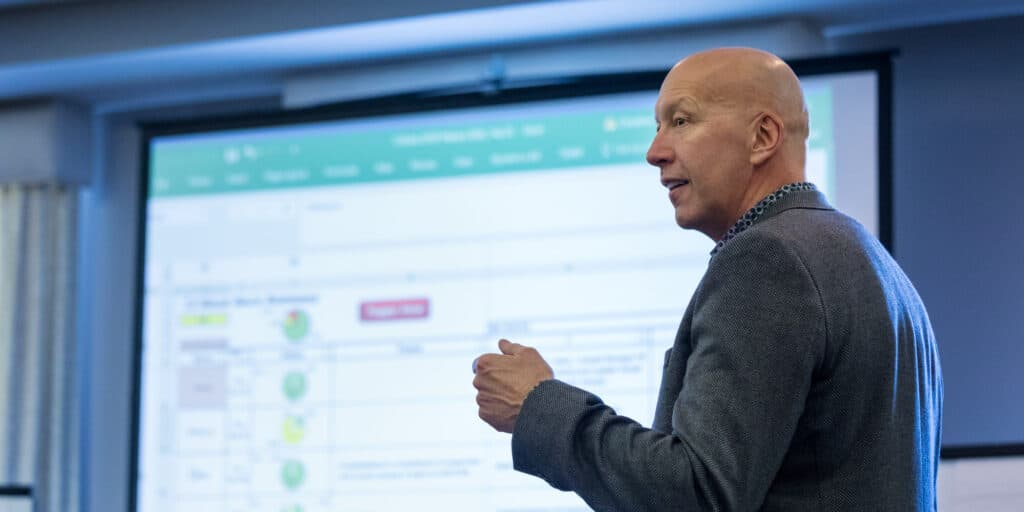
Champion PSI understands how powerful questions can be. Our approach is centered around asking the right questions that provoke thought, stimulate conversation, and uncover deeper insights.
We understand that each coaching scenario is unique, and thus tailor our questions to fit the specific needs and objectives of our clients.
Feedback from our clients attests to the effectiveness of our approach. Many have expressed how our thought-provoking questions have led to breakthroughs in their personal and professional lives.
They have found our sessions to be transformative, allowing them to unlock their potential and achieve their goals.
Unlock Potential and Achieve Success—One Question at A Time
In the world of professional growth, the right question can make all the difference. And in a conversation with an executive coach—powerful questions significantly enhance effectiveness. Knowing the right questions to ask, and how to ask them, is a skill that takes practice and refinement.
As a leader in business and executive coaching, Champion PSI has over 25 years of experience in utilizing powerful questions that are tailored to your unique situation. These are used to guide you through goal-setting, strategic decision-making, and success measurement.
Contact Champion PSI today to set up a free 30-minute discovery call.
